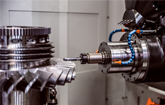
From the 3D Printer into Space
The symbiosis of topology optimization and additive manufacturing will bring one of longest components ever manufactured by industrial 3D printing into space. The new component is stronger and weighs only half what its predecessor did.
TROY, Mich., Oct. 28, 2014 /PRNewswire/ -- Altair announced today that RUAG Space, with the support of Altair ProductDesign, has built a redesigned, optimized antenna support for an Earth observation satellite, to be produced using industrial additive manufacturing, or 3D printing. The objective was to create an aluminum component that would be significantly stiffer while at the same time lighter, taking full advantage of the design freedom afforded by 3D printing.
To redesign and optimize the antenna, engineers used Altair HyperWorks® solver OptiStruct®, guaranteeing a load-sufficient material distribution. For the design, engineers used solidThinking Evolve®. Design freeze was reached after only four weeks. The component was then manufactured with a 3D printer, with no need of further design adjustments. Using topology optimization in conjunction with additive manufacturing, the team achieved elite weight and stiffness performance characteristics not possible using conventional analysis and manufacturing techniques.
EOS, the German market leader in the area of industrial 3D printing, contributed its additive manufacturing expertise, handling the manufacturing of the aluminum components. Weight reduction is a decisive factor in the space industry since the lighter a satellite is, the less it costs to launch. Some 40 centimeters long, the antenna support is one of the longest metal components ever produced using the powder bed manufacturing method. To check that the new support is ready for use in space, it is currently undergoing a battery of intensive qualification tests that are scheduled to be completed by the end of the year.
"Our goal is to equip one of the future Sentinel-1 satellites with antenna support components that have been manufactured using an industrial 3D printer," explained Michael Pavloff, Chief Technical Officer at RUAG Space. He went on to add that the production of this antenna support was by no means a one-off. "3D printing has enormous potential for our business, and we are currently in the process of developing further space applications. In the future it will be possible to create entire satellite structures using a 3D printer. This means that electrical harnesses, reflectors, heating pipes, and other assemblies that today still have to be manufactured individually could then be integrated directly into the structural elements," Pavloff concludes.
RUAG Space has been conducting intensive research and development work on how to print objects in three dimensions since 2013. Making a metal 3D print involves building up layers of powder and joining them together to form the desired shape in an automated process of laser sintering.
"At Altair we were delighted to contribute to such a significant milestone in satellite design. The collaboration with RUAG Space and EOS allowed us to deliver even more innovative end-to-end design and optimization processes to exploit the benefits of additive manufacturing," said Pietro Cervellera, Managing Director Altair GmbH.
The project will be presented today at the ESA Conference in Noordwijk, Netherlands and during the Altair-hosted Additive Manufacturing Design and Engineering Symposium on Nov. 26 at EuroMold 2014. Further information on the symposium and a registration form may be found here.
About RUAG Space
RUAG Space is Europe's leading equipment supplier to the space industry. With 1,150 employees at seven sites in Switzerland, Sweden and Austria, the RUAG Space Division recorded total sales of 299 million Swiss Francs in 2013. RUAG is an international technology group for the aerospace and defence markets. Its head office is in Bern, Switzerland. RUAG's production facilities are located in Switzerland, Germany, Sweden, France, Austria, Hungary, Australia and the United States. RUAG has about 8,200 employees worldwide, including 414 trainees in 23 different professions.
About EOS
Founded in 1989 and headquartered in Germany, EOS is the technology and market leader for design-driven, integrated e-Manufacturing solutions for industrial applications. EOS offers a modular solution portfolio including systems application know-how, software, process parameters, materials and its further development. The portfolio is completed by services, maintenance, application consulting and trainings. An Additive Manufacturing (AM) process, it allows the fast and flexible production of high-end parts at a repeatable industry level of quality. A disruptive technology it paves the way for a paradigm shift in product design and manufacturing. It accelerates product development, offers freedom of design, optimizes part structures – also enabling lattice structures – and functional integration and as such creates significant competitive advantages for its customers. To learn more please visit: www.eos.info.
About Altair
Altair is focused on the development and broad application of simulation technology to synthesize and optimize designs, processes and decisions for improved business performance. Privately held with more than 2,300 employees, Altair is headquartered in Troy, Michigan, USA and operates more than 40 offices throughout 22 countries. Today, Altair serves more than 5,000 corporate clients across broad industry segments. To learn more, please visit www.altair.com.
Photo - http://photos.prnewswire.com/prnh/20141027/154671
SOURCE Altair






Share this article